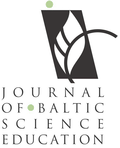THE COMPARISON OF OR-IPA TEACHING MODEL AND PROBLEM BASED LEARNING MODEL EFFECTIVENESS TO IMPROVE CRITICAL THINKING SKILLS OF PRE-SERVICE PHYSICS TEACHERS
| Title | THE COMPARISON OF OR-IPA TEACHING MODEL AND PROBLEM BASED LEARNING MODEL EFFECTIVENESS TO IMPROVE CRITICAL THINKING SKILLS OF PRE-SERVICE PHYSICS TEACHERS |
| Publication Type | Journal Article |
| Year of Publication | 2018 |
| Authors | Jatmiko, B, Prahani, BK, Munasir,, Supardi, IZA, Wicaksono, I, Erlina, N, Pandiangan, P, Althaf, R, Zainuddin, |
| Journal | Journal of Baltic Science Education |
| Volume | 17 |
| Issue | 2 |
| Start Page | 300-319 |
| Pagination | Continuous |
| Date Published | April/2018 |
| Type of Article | Original article |
| ISSN | 1648-3898 |
| Other Numbers | E-ISSN 2538-7138 |
| Keywords | and PBL model, basic physics, critical thinking skills, OR-IPA model, pre-service physics teachers |
| Abstract | Critical thinking skills are one of the 21st century skills that are effectively trained by using the OR-IPA and Problem Based Learning (PBL) Model, therefore this research aims to compare the effectiveness of both. Research design used True Experiment with Randomized Subject Control-group Pre-test and Post-test with 94 pre-service physics teachers. Data collected using the critical thinking skills test and the student response sheet, and then analyzed using t-test and N-gain. The results showed: (1) the teaching instruments of OR-IPA and PBL Model have fulfilled the validity requirements (rα ~ .26) and reliability (α = .96 - .99). (2) Each of OR-IPA, PBL, and Conventional Model can significantly increase critical thinking skills at α = 5%, respectively with average N-gain: medium (.60), medium (.48), and low (.14); with the student response of: very positive, very positive, and less positive. (3) The OR-IPA and PBL Model are effective to improve critical thinking skills, while the Conventional Model is ineffective, and the OR-IPA Model is more effective compared to the PBL Model. Implication of this research is that the OR-IPA Model can be an innovative solution to improve critical thinking skills, but there is still a need for repetitive research like this. |
| URL | http://oaji.net/articles/2017/987-1523527582.pdf |
| DOI | 10.33225/jbse/18.17.300 |
| Refereed Designation | Refereed |
| Full Text |
